Tribunal Statistics Quarterly, April to June 2021
Published 9 September 2021
1. Main Points
This publication presents tribunals statistics for the latest quarter (April to June 2021, Q1 2021/22), compared to the same quarter the previous year.
This publication does not include Employment Tribunal (ET) and Employment Appeal Tribunal (EAT) data due to issues identified when these tribunals were migrated to a new operational system. The data will be made available as soon as this is resolved, and the data is quality assured. The total of the remaining jurisdictions is referred to in this publication and accompanying tables as the ‘Interim Total’ and has been provided to allow year-on-year comparisons over time.
As different tribunals were affected in different ways due to measures required to deal with the pandemic, additional comparisons to the first quarter of 2019/20 have also been provided.
For technical detail about data sources, quality, policy changes and terminology, please refer to the accompanying Guide to Tribunal Statistics.
| The interim[footnote 1] overall volumes of receipts and disposals have increased, and caseload outstanding has decreased | Her Majesty’s Courts & Tribunals Service (HMCTS) recorded an increase of 26% and 17% in the interim[footnote 1] totals for receipts and disposals respectively in April to June 2021 compared to the previous year, driven mostly by First-Tier Tribunal Immigration and Asylum Chamber (FTTIAC). Caseload outstanding interim[footnote 1] total decreased by 23%. However, compared to the same quarter in 2019/20 (pre-pandemic), the interim[footnote 1] totals have decreased by 34%, 38% and 37% respectively. |
| SSCS receipts, disposals and caseload outstanding all decreased | Social Security and Child Support (SSCS) receipts, disposals and caseload outstanding decreased (by 10%, 5% and 54% respectively). A 13% and 23% fall in Personal Independence Payment (PIP) and Universal Credit (UC) respectively drove the fall in receipts. The decrease in disposals was driven mostly by a 63% and 8% fall in Employment Support Allowance (ESA) and PIP respectively. Compared to 2019, SSCS totals decreased by 56%, 46% and 67% respectively. |
| FTTIAC receipts, disposals and caseload outstanding all increased | First-Tier Tribunal Immigration and Asylum Chamber (FTTIAC) receipts, disposals and caseload outstanding rose (by 385%, 152% and 58% respectively) compared to the same period in 2020. However, compared to 2019 (pre-pandemic), these totals rose by 28%, fell by 38% and rose by 37% respectively. |
| UTIAC receipts and caseload outstanding declined whilst disposals rose | In Q1 2021/22 there was a 58% and 29% fall in Upper Tribunal Immigration and Asylum Chamber (UTIAC) receipts and caseload outstanding respectively compared to Q1 2020/21. UTIAC disposals increased by 124% over the same period. Compared to 2019, receipts, disposals and caseload outstanding decreased by 69%, 67% and 8% respectively. |
| SEND receipts and disposals increased whilst caseload outstanding decreased | Special Educational Needs and Disability (SEND) receipts and disposals rose, by 10% and 20% respectively, compared to the same period in 2020. Caseload outstanding fell, by 2%. Compared to 2019, receipts and disposals rose by 4% and 40% respectively whilst caseload outstanding remained level. |
For feedback related to the content of this publication, please contact us at CAJS@justice.gov.uk
2. Statistician’s Comment
This quarter’s publication does not include Employment Tribunals (ET) data. This is because ET has moved to a new case management system and HMCTS is currently working to incorporate the new IT system alongside longer-established data sources to provide a more complete and consistent data set for this jurisdiction. The data will be made available when the systems merger has been appropriately quality assured.
Activity in the Tribunals continues to be driven by the impacts of policies put in place due to COVID-19. As these policies come to an end and restrictions are eased, we begin to see a rise in demand and a return to pre-COVID19 levels of receipts of some Tribunals.
The Home Office has started working through their backlogs as travel restrictions are lifted and visa centres in the UK and abroad resume normal service. Immigration and Asylum appeals receipts have increased significantly this quarter – now rising above pre-COVID19 levels. This increase is mainly due to an increase in EEA/EUSS appeals. Disposals also increased with greater use of video hearings; however, as the main deadline for the EU Settlement Scheme ended on 30th June 2021, the EEA/EUSS caseload has grown.
SSCS data shows volumes of disposals, receipts and outstanding cases have continued their downward trend and are still far below 2019’s pre-COVID19 baseline. Receipts and disposals are down 10% and 5% respectively on last year and 56% and 46% below pre-COVID levels, while outstanding cases have fallen much lower (by 54%) when compared to last year and 67% below the 2019 baseline. We expect receipts will return to pre-COVID levels later this year as government support comes to an end.
Looking ahead, as COVID-19 restrictions and policies put in place come to an end, volumes are likely to return to or in some cases exceed trend levels. Tribunals will utilise greater use of video hearings to deal with potential demand on HMCTS services.
3. Overview of Tribunals
Receipts interim[footnote 1] total was 50,000 and disposals interim[footnote 1] total was 54,000
In April to June 2021, HMCTS recorded a 26% and 17% increase in the interim[footnote 1] totals for receipts and disposals respectively, when compared to the same quarter in 2020. Caseload outstanding interim[footnote 1] total decreased to 113,000, down 23%, over the same period.
This summary bulletin focuses mainly on the Social Security and Child Support (SSCS) tribunal and the First Tier Tribunal Immigration and Asylum Chamber (FTTIAC) as they made up the majority (64%) of tribunal interim[footnote 1] receipts in April to June 2021:
-
Social Security and Child Support (SSCS) – 39% of the interim[footnote 1] receipts total
-
First Tier Tribunal Immigration and Asylum Chamber (FTTIAC) – 26% of the interim[footnote 1] receipts total
Figure 3.1: Receipts interim[footnote 1] totals, Q1 2017/18 to Q1 2021/22 (Source: Tables S_2)
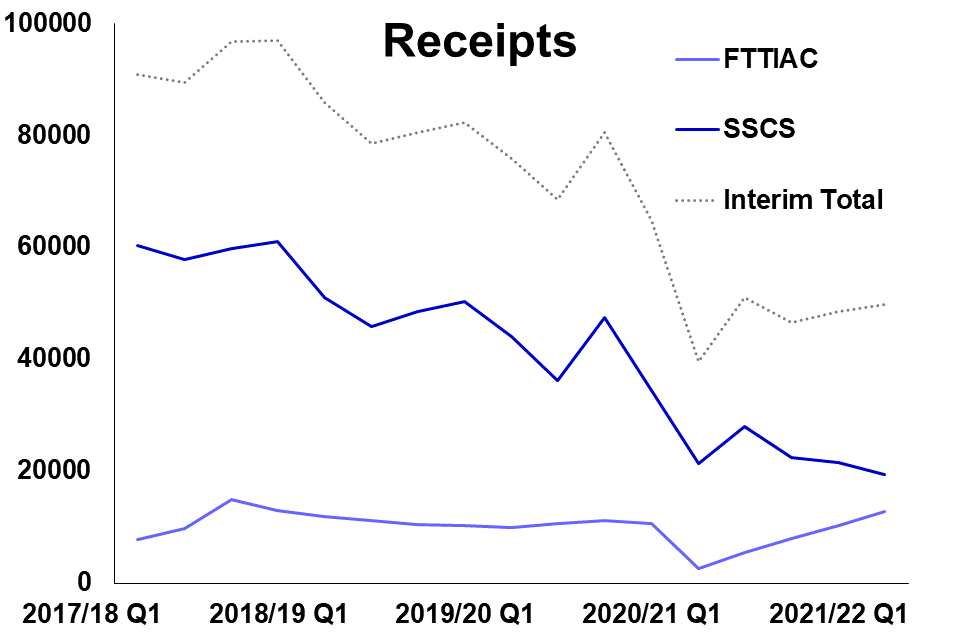
Figure 3.2: Disposals interim[footnote 1] totals, Q1 2017/18 to Q1 2021/22 (Source: Tables S_3)
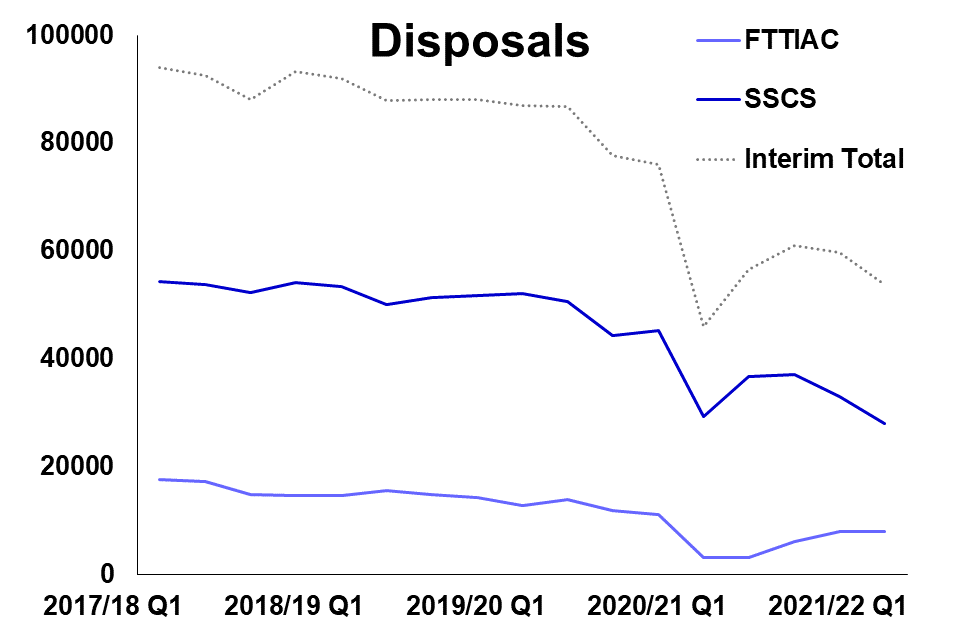
Figure 3.3: Caseload outstanding[footnote 2] interim[footnote 1] totals, Q1 2017/18 to Q1 2021/22 (Source: Tables S_4)
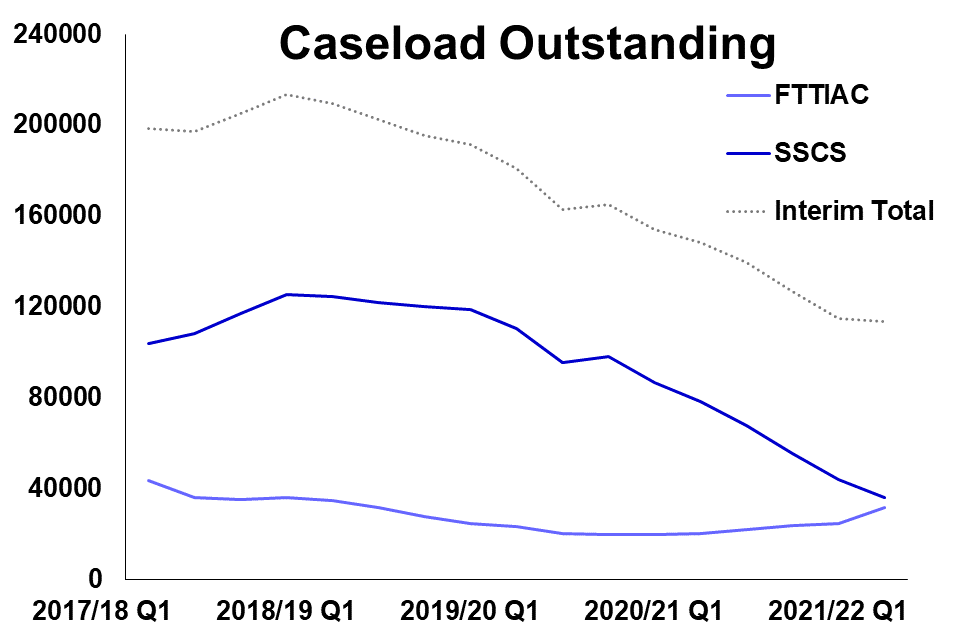
The charts above show the trends in receipts, disposals and caseload outstanding over the last three years for SSCS, FTTIAC and all tribunals overall (using the Interim Total measure). In April to June 2021, receipts increased by 26% compared to April to June 2020. This was driven by increases in FTTIAC of 385%, to 13,000 receipts. This rise is largely due to case levels returning to normal following the impact of the COVID-19 pandemic and related government actions to mitigate the effects on society in the previous financial year.
Disposals rose by 17% in April to June 2021 (54,000 disposals), compared to April to June 2020. When comparing disposals to Q1 2019/20, which was pre-COVID, the volume decreased by 38%. The FTTIAC disposed of 152% more cases in the same period. When compared to the same quarter in 2019 it decreased by 38%. The rise compared to 2020 reflects the increase seen in receipts and the lifting of COVID-19 restrictions. SSCS disposals (which makes up over half of the disposals) decreased by 5%.
There were 113,000 cases outstanding at the end of June 2021, down 23% compared to a year ago. The 58% increase in FTTIAC, was offset by a 54% decrease in SSCS caseload outstanding.
4. Social Security and Child Support
SSCS receipts, disposals and caseload outstanding all decreased
SSCS receipts, disposals and caseload outstanding have all decreased when compared to April to June 2020, by 10%, 5% and 54% respectively.
64% of disposals were cleared at hearing with a 62% overturn rate
Of the 28,000 disposals in April to June 2021, 64% were cleared at a hearing and of these, 62% had the initial decision revised in favour of the claimant (down from 70% and 77% in the same period in 2020 respectively).
Figure 4.1: Social Security and Child Support receipts, Q1 2019/20 to Q1 2021/22 (Source: Tables SSCS_1)
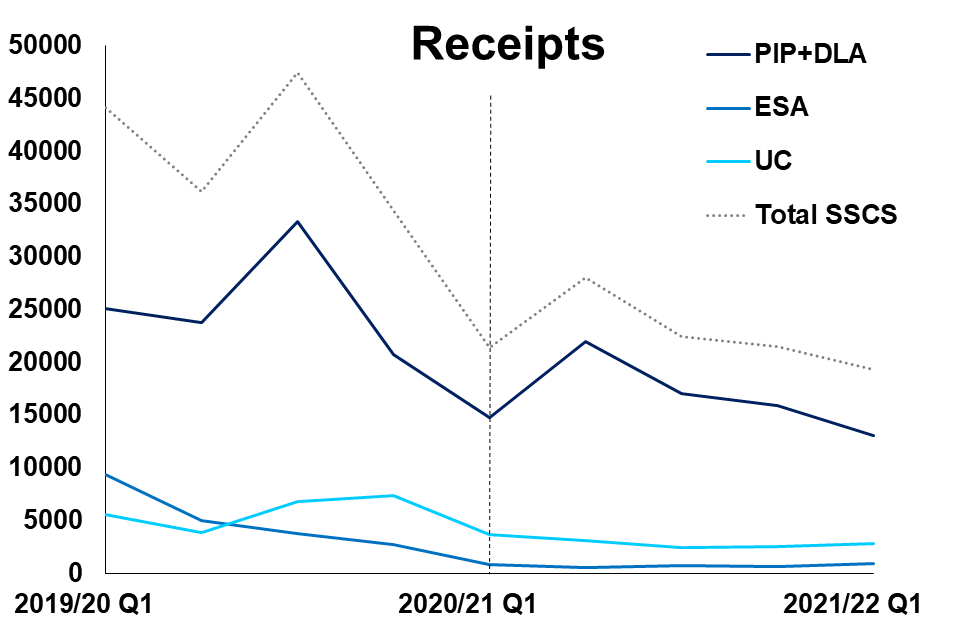
Figure 4.2: Social Security and Child Support disposals, Q1 2019/20 to Q1 2021/22 (Source: Tables SSCS_2)
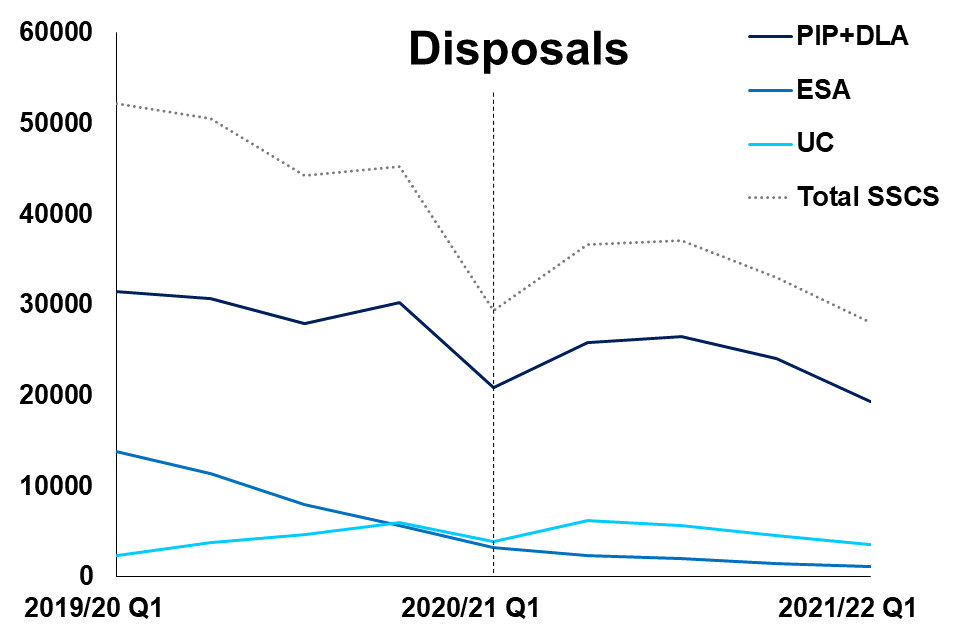
Figure 4.3: Social Security and Child Support caseload outstanding, Q1 2019/20 to Q1 2021/22 (Source: Tables S_4)
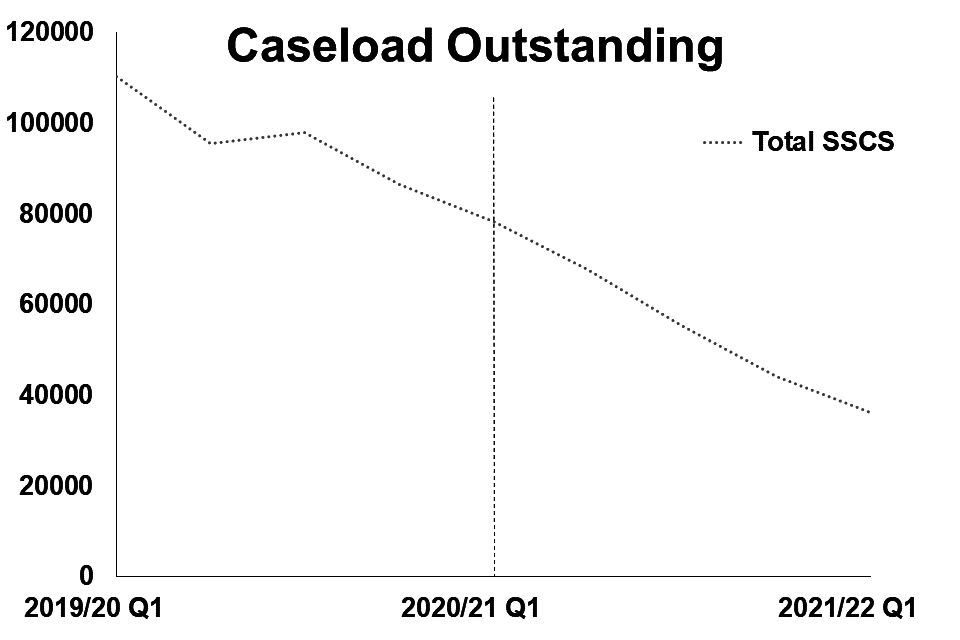
The economic impact of the COVID-19 pandemic has resulted in an increase in the number of people on Universal Credit[footnote 3]. The Department for Work and Pensions (DWP) changes to benefit processes in response to the pandemic, such as the temporary suspension of face-to-face assessments for health and disability-related benefits, will have contributed to a fall in SSCS tribunal receipts.
SSCS tribunal receipts decreased by 10% this quarter, to 19,000 appeals, when compared to April to June 2020. This was driven by a 13% and 23% fall in Personal Independence Payments (PIP) and Universal Credit (UC) respectively. PIP and UC appeals accounted for 61% and 15% of all SSCS receipts respectively in April to June 2021.
PIP also made up nearly two thirds of SSCS disposals (64%). In April to June 2021, there were 28,000 SSCS cases disposed of, a fall of 5% when compared with the same period in 2020. SSCS disposals rose between Q2 2020/21 and Q3 2020/21, then fell in Q4 2020/21 (from 37,000 to 33,000) and in Q1 2021/22.
Of the disposals made by the SSCS Tribunal, 18,000 (64%) were cleared at hearing, and of these, 62% were found in favour of the customer (down from 70% and 77% on the same period in 2020 respectively). This overturn rate varied by benefit type, with PIP at 70%, Disability Living Allowance (DLA) 65%, Employment Support Allowance (ESA) 57%, and UC 46%. The PIP, DLA, ESA and UC overturn rates fell nine, eight, 27 and 27 percentage points on April to June 2020 respectively.
There were 36,000 SSCS cases outstanding at the end of June 2021, down 54% compared to the same period in 2020. This continues the fall that began in Q4 2018/19 (when comparing to the same quarter in the previous year). Since Q4 2017/18, caseload outstanding has been gradually decreasing (from a peak of 125,000), only rising in Q3 2019/20, reversing the consistent rising trend seen since Q4 2015/16.
Of those cases disposed of by the SSCS tribunal in April to June 2021, the mean age of a case at disposal was 39 weeks, eight weeks more than for the same period in 2020 (see tables T_2) and nine weeks more than the same period in 2019.
5. Immigration and Asylum
First-tier Tribunal Immigration and Asylum Chamber (FTTIAC)
In April to June 2021, FTTIAC receipts and disposals increased, by 385% and 152% (to 13,000 and 8,000) respectively, compared to the same period in 2020.
In the same period, caseload outstanding also increased by 58% (to 32,000).
Figure 5.1: First-tier Tribunal Immigration and Asylum Chamber receipts, Q1 2019/20 to Q1 2021/22 (Source: Tables FIA_1)
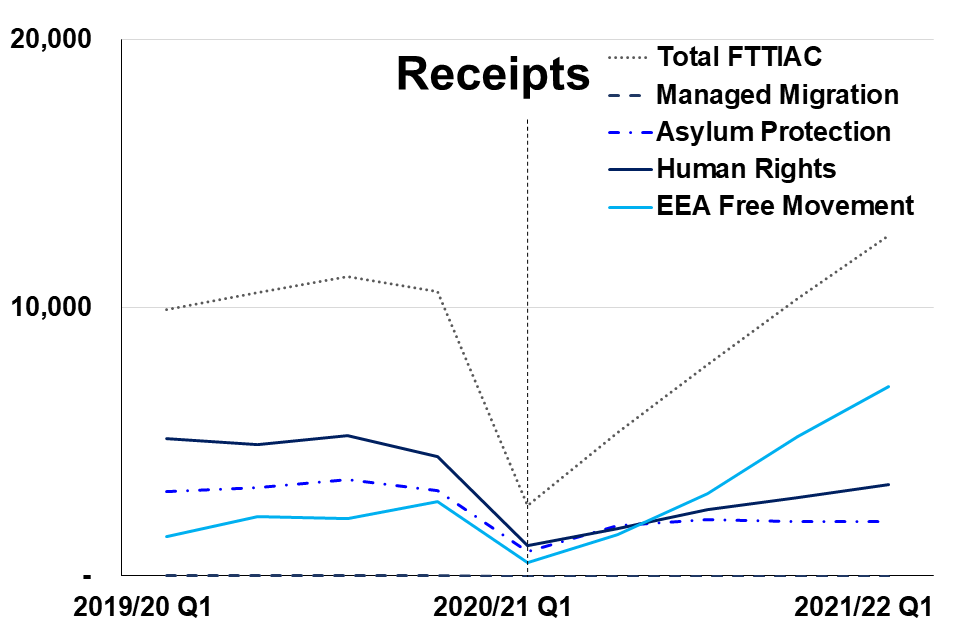
Figure 5.2: First-tier Tribunal Immigration and Asylum Chamber disposals, Q1 2019/20 to Q1 2021/22 (Source: Tables FIA_2)
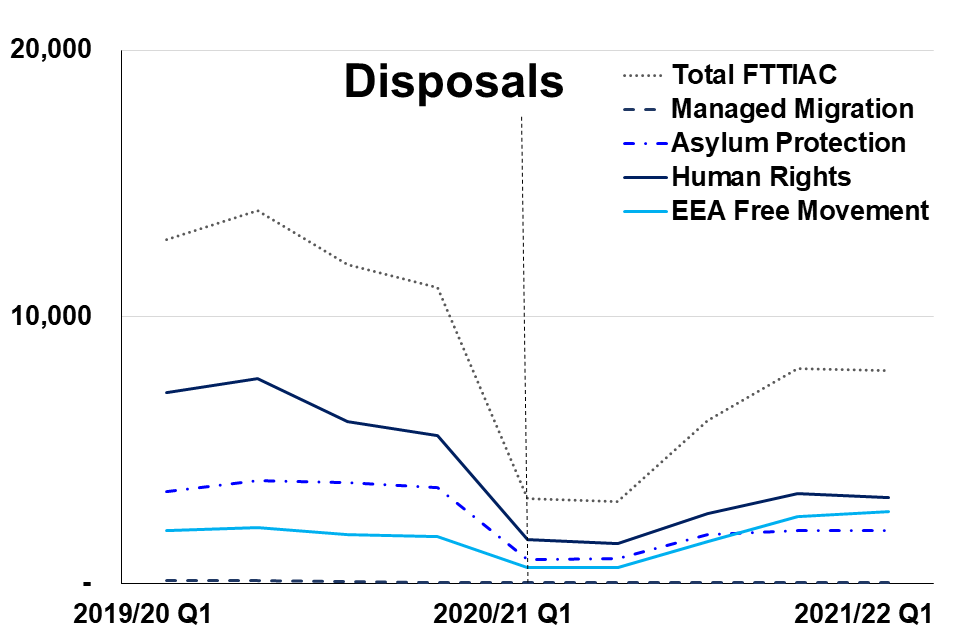
Figure 5.3: First-tier Tribunal Immigration and Asylum Chamber caseload outstanding, Q1 2019/20 to Q1 2021/22 (Source: Tables S_4)
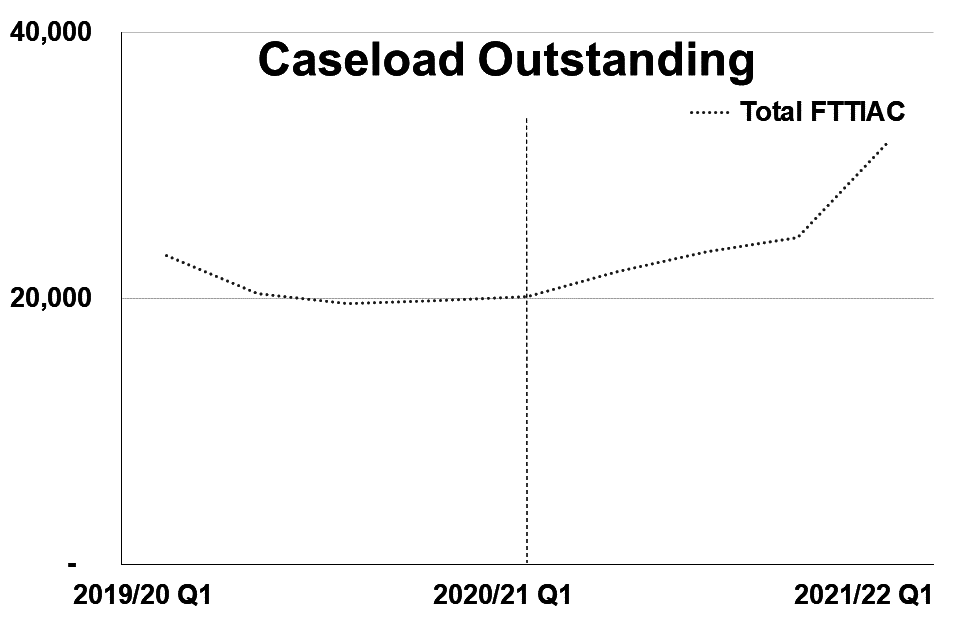
The main deadline for the EU Settlement Scheme (EUSS) passed on 30 June 2021. In April to June 2021, EEA Free Movement receipts proportionally represented 56% of all FTTIAC receipts (up from 19% a year ago). In Q1 2021/22 there was a 1,336%, 203% and 128% increase in EEA, Human Rights (HR) and Asylum/Protection (AP) receipts respectively (to 7,100, 3,400 and 2,000 respectively), compared to the same period in 2020. HR and AP proportionally represented 27% and 16% of all FTTIAC receipts respectively (down 16 and 18 percentage points respectively from a year ago).
Following on from a steep fall in Q1 2020/21 due to the pandemic, this quarter there was a sharp rise in FTTIAC receipts to 13,000 - the highest volume since Q4 2017/18. The rise was mainly due to an increase in EEA/EUSS appeals. Now that EU exit negotiations have concluded, demand is increasing, with overall receipts rising quarter on quarter since Q2 2020/21.
The FTTIAC disposed of 8,000 appeals in April to June 2021, a 152% increase on the same period in 2020. The Home Office has started working through their backlogs as travel restrictions are lifted and visa centres in the UK and abroad resume normal service. Disposals increased with greater use of video hearings; however, as the main deadline for the EU Settlement Scheme ended on 30th June 2021, the EEA/EUSS caseload has grown. This rise was driven by a 95%, 125% and 357% rise in HR, AP and EEA respectively. Human Rights appeals continue to make up the largest proportion (40%) of all FTTIAC disposals in April to June 2021, down from 52% a year ago.
Of the disposals made in the FTTIAC this quarter, 68% were determined i.e. a decision was made by a judge at a hearing or on the papers (compared to 77% in Q1 2019/20 and 67% in Q1 2020/21); 17% were withdrawn (compared to 19% in Q1 2019/20 and 27% in Q1 2020/21); 7% were struck out for non-payment of the appeal fee (compared to 2% in Q1 2019/20 and 2% in Q1 2020/21), and 3% were invalid or out of time (compared to 2% in Q1 2019/20 and 3% in Q1 2020/21). Half of the 5,400 cases determined at a hearing or on the papers were allowed/granted, although this varied by case type (48% of Asylum/Protection, 55% of Human Rights and 45% of EEA Free Movement appeals were allowed/granted).
In the FTTIAC, the mean time taken to clear appeals across all categories has increased by 11 weeks to 44 weeks this quarter, compared to the same period a year ago. Asylum/Protection, Human Rights and EEA Free Movement had mean times taken of 51 weeks, 54 weeks and 41 weeks respectively.
Upper Tribunal Immigration and Asylum Chamber (UTIAC)
In April to June 2021, UTIAC receipts decreased by 58%, whilst disposals increased, by 124%, when compared to the same period in 2020. Caseload outstanding fell 29% over the same period.
UTIAC judicial review receipts continue to fall - down 5%, to 520. Disposals rose by 3%, to 480, whilst caseload outstanding fell by 43%, to 700, compared to April to June 2021.
At the UTIAC, there were 390 appeal receipts in April to June 2021, down 69% and 58% on the same period in 2019 and 2020 respectively. AP, HR and EEA receipts drove the decreases in receipts, falling 74%, 74% and 24% to 260, 530 and 100 appeals compared to 2019 respectively and falling 48%, 71% and 22% to 140, 150 and 80 appeals compared to 2020 respectively.
Over the same period, UTIAC disposals increased by 124% to 590, likely due to case levels returning to normal following a decrease at the start of the pandemic. UTIAC disposals fell 67% when compared to Q1 2019/20 (see table UIA_2).
At the end of June 2021, the UTIAC caseload outstanding stood at 1,400, a 8% and 29% decrease on the end of June 2019 and the end of June 2020 respectively.
UTIAC Immigration and Asylum Judicial Reviews
In April to June 2021, there were 520 Immigration and Asylum Judicial Review receipts and 480 disposals, down 5% and up 3% respectively on April to June 2020.
Of the 480 Immigration and Asylum Judicial Reviews disposed of in the UTIAC in April to June 2021, 53% were determined and 1% were transferred to the Administrative Court. The remaining 46% were in the ‘Other’ category, which includes cases that were withdrawn or not served.
During April to June 2021, 320 UTIAC Judicial Review applications were determined by paper hearing, of which 10% were allowed to continue to the substantive hearing stage. A further 85 were reconsidered at an oral renewal, of which 34% were allowed to continue to the substantive hearing stage. There were 9 substantive hearings which were determined in April to June 2021, of which 56% were granted in favour of the appellant (see table UIA_3).
6. Gender Recognition Certificates
212 Gender Recognition Panel (GRP) applications were received and 129 were disposed of between April to June 2021; 241 applications were pending by the end of June 2021
126 more applications were received by the GRP this quarter, compared to April to June 2020, and the 212 applications is the highest number seen in any one quarter since 2009. Of the 129 applications disposed of, a full Gender Recognition Certificate (GRC) was granted in 93% of cases (120 full GRCs), three percentage points lower than in the same period in 2020 (where 80 full GRCs were granted out of 83 disposals).
GRP receipts have increased annually since 2017/18 and we expect this trend to continue following a reduction in the application fee in May 2021.
Since April 2005/06, when the Gender Recognition Act 2004 came into effect, 72% of interim certificates (170 of the 237 interim GRCs granted) have been converted to a full GRC, 52% of which were converted within 30 weeks. No interim certificates were converted to a full GRC between April to June 2021.
Of the 120 full certificates granted in April to June 2021, 14 were for married applicants and 105 for single applicants (the marital status for the remaining applicant was ‘other’). 55 (46%) of the individuals granted full certificates were registered male at birth while 65 (54%) were registered female at birth.
Figure 6.1: Applications for Gender Recognition Certificates received, disposed of and pending, 2010/11 to 2020/21 (Source: Tables GRP_1 and GRP_2)
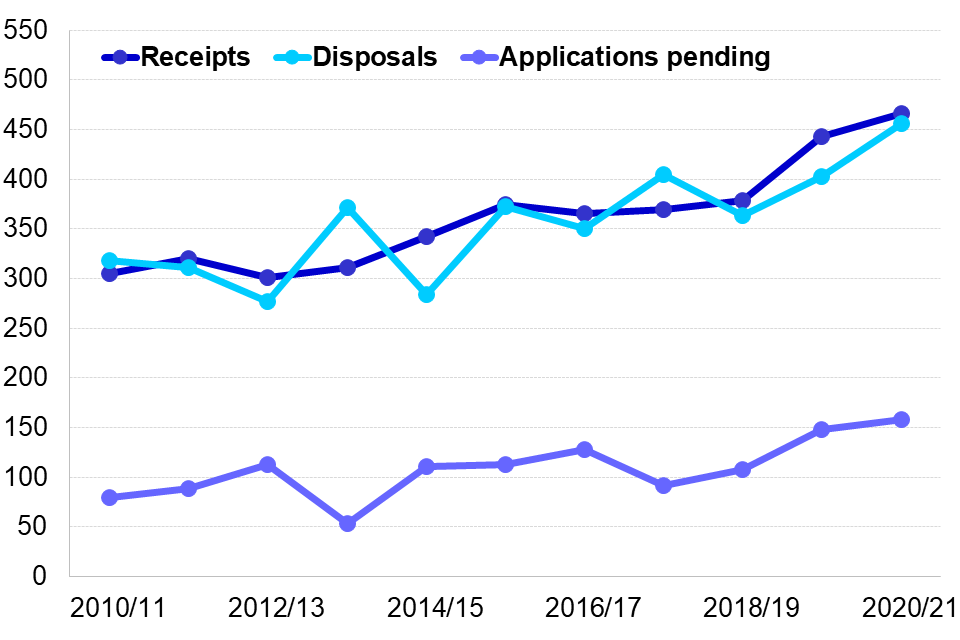
Figure 6.2: Full Gender Recognition Certificates granted by year of birth, 2010/11 to 2020/21 (Source: Table GRP_4)
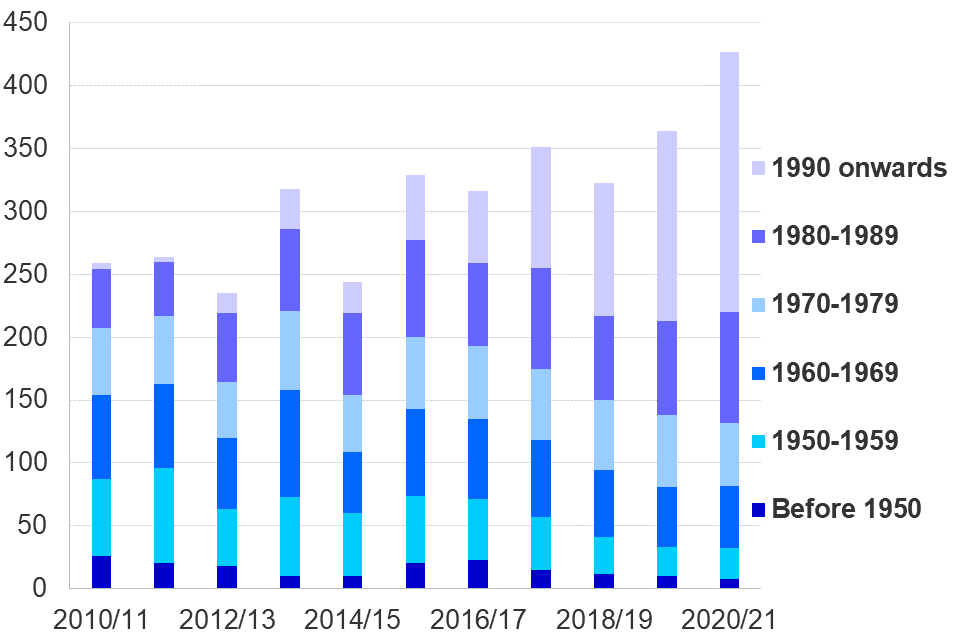
7. Special Educational Needs and Disability (SEND)
There were 2,300 receipts and 2,200 disposals for the SEND tribunal in Q1 2021/22; 2,700 applications were outstanding at the end of the same quarter
The SEND tribunal receipts rose by 10% (to 2,300) in Q1 2021/22 when compared to the same quarter in 2020/21. SEND receipts fell between Q2 2020/21 and Q3 2020/21 (from 2,600 to 1,600) before rising in Q4 2020/21 and Q1 2021/22.
The number of SEND disposals rose by 20% (to 2,200) in April to June 2021 compared to April to June 2020. When comparing one quarter to the next quarter, SEND disposals fell slightly in Q3 2020/21 and Q4 2020/21, before rising in Q1 2021/22.
SEND caseload outstanding at the end of Q1 2021/22 decreased by 2% (to 2,700) when compared to the end of Q1 2020/21.
Figure 7.1: Registered SEND appeals, Q1 2011/12 to Q1 2021/22 financial year (Source: Tables S_2, S_3 and S_4)
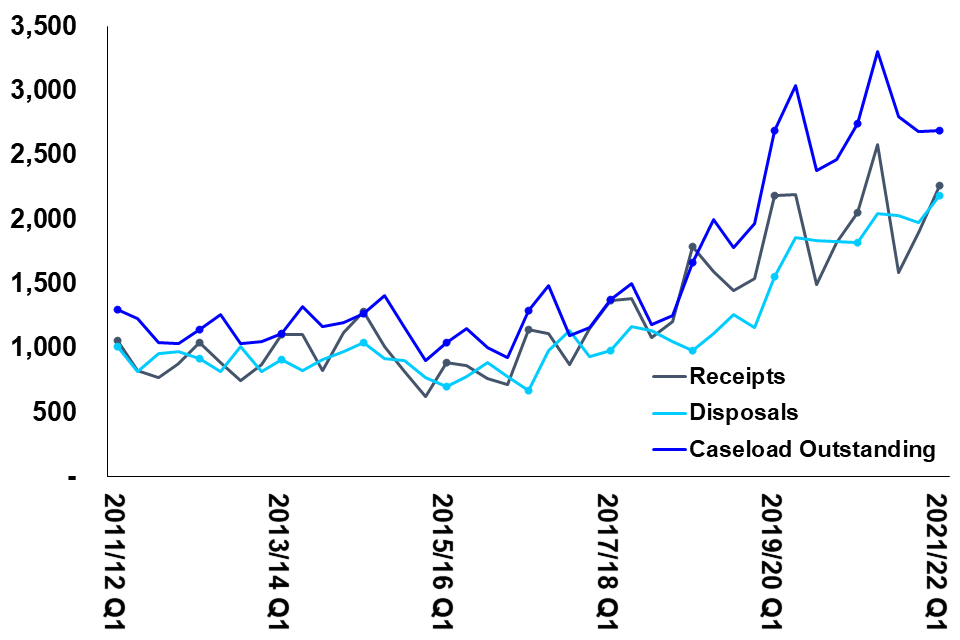
8. Further information
Rounding convention
Figures greater than 10,000 are rounded to the nearest 1,000, those between 1,000 and 10,000 are rounded to the nearest 100 and those between 100 to 1,000 are rounded to the nearest 10. Less than 100 are given as the actual number.
Accompanying files
As well as this bulletin, the following products are published as part of this release:
-
A supporting document providing further information on how the data is collected and processed, as well as information on the revisions policy and legislation relevant to trends and background on the functioning of the tribunal system.
-
The quality statement published with this guide sets out our policies for producing quality statistical outputs for the information we provide to maintain our users’ understanding and trust.
-
A set of overview tables, covering each section of this bulletin.
-
A set of CSV files including data on two of the three large tribunals (SSCS and Immigration and Asylum) and an overall receipts and disposals CSV, covering all tribunal types.
-
Additional releases this quarter:
- Update to the statistical notice on Immigration and Asylum (I&A) Detained Immigration Appeals (DIA) to include data to Q1 2021/22.
Future publications
Our statisticians regularly review the content of publications. Development of new and improved statistical outputs is usually dependent on reallocating existing resources. As part of our continual review and prioritisation, we welcome user feedback on existing outputs including content, breadth, frequency and methodology. Please send any comments you have on this publication including suggestions for further developments or reductions in content.
Contact
Press enquiries should be directed to the Ministry of Justice or HMCTS press office:
Daniel Mulloy - email: Daniel.Mulloy@Justice.gov.uk
Other enquiries and feedback on these statistics should be directed to the Data and Evidence as a Service division of the Ministry of Justice:
Rita Kumi-Ampofo or Matteo Chiesa - email: CAJS@justice.gov.uk
Next update: 9 December 2021 (URL: www.gov.uk/government/collections/tribunals-statistics)
© Crown copyright Produced by the Ministry of Justice
For any feedback on the layout or content of this publication or requests for alternative formats, please contact CAJS@justice.gov.uk
-
The interim totals for the overall volumes of tribunal receipts, disposals and caseload outstanding exclude the Employment Tribunal and Employment Appeal Tribunal for which the June 2021 data is currently not available. See the main tables S_2, S_3 and S_4 for more information. ↩ ↩2 ↩3 ↩4 ↩5 ↩6 ↩7 ↩8 ↩9 ↩10 ↩11 ↩12 ↩13 ↩14
-
Outstanding caseload is based on a snapshot in time based on the last day of each quarter. ↩
-
Universal Credit statistics, 29 April 2013 to 8 July 2021 - GOV.UK (www.gov.uk) ↩
